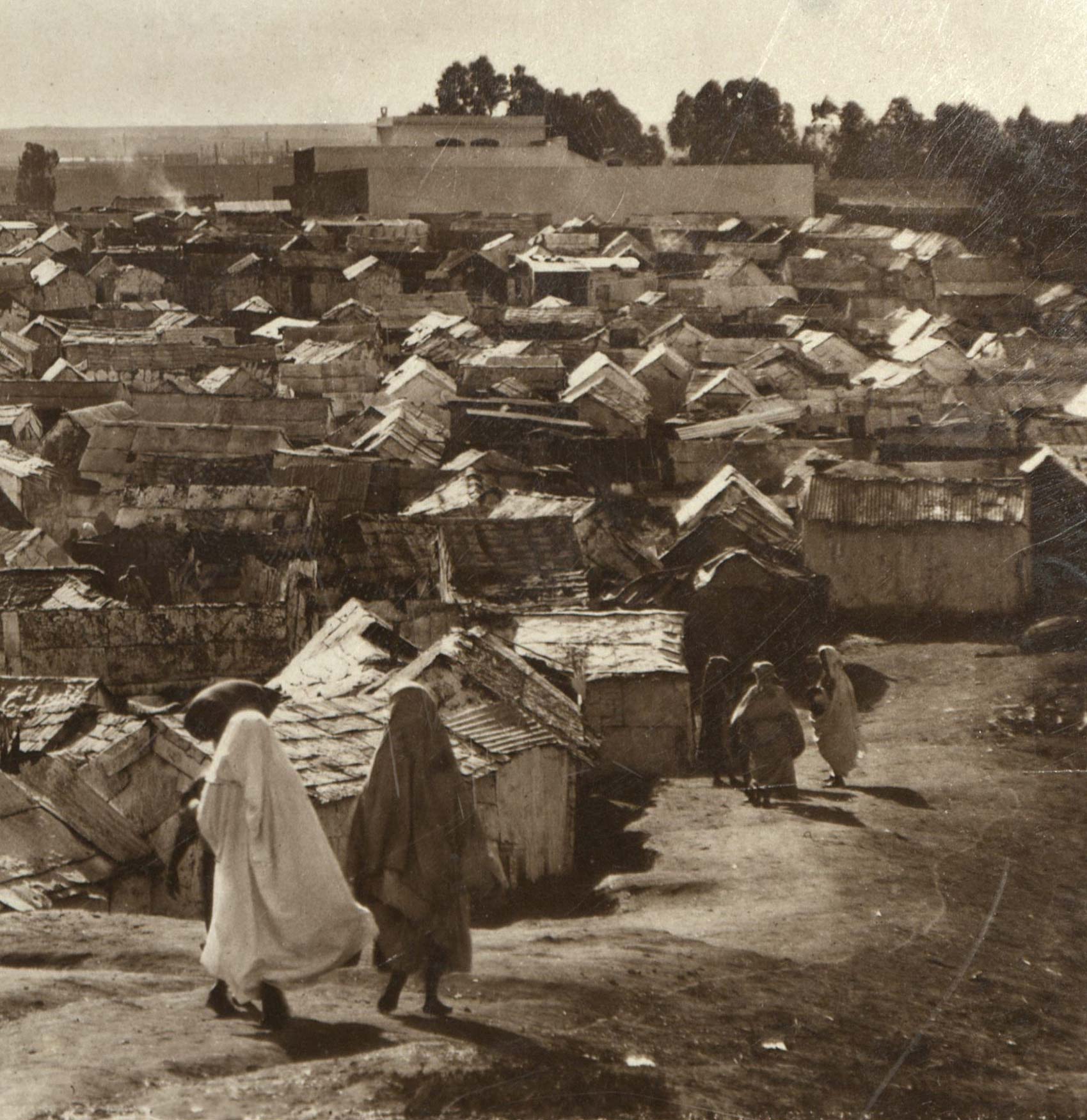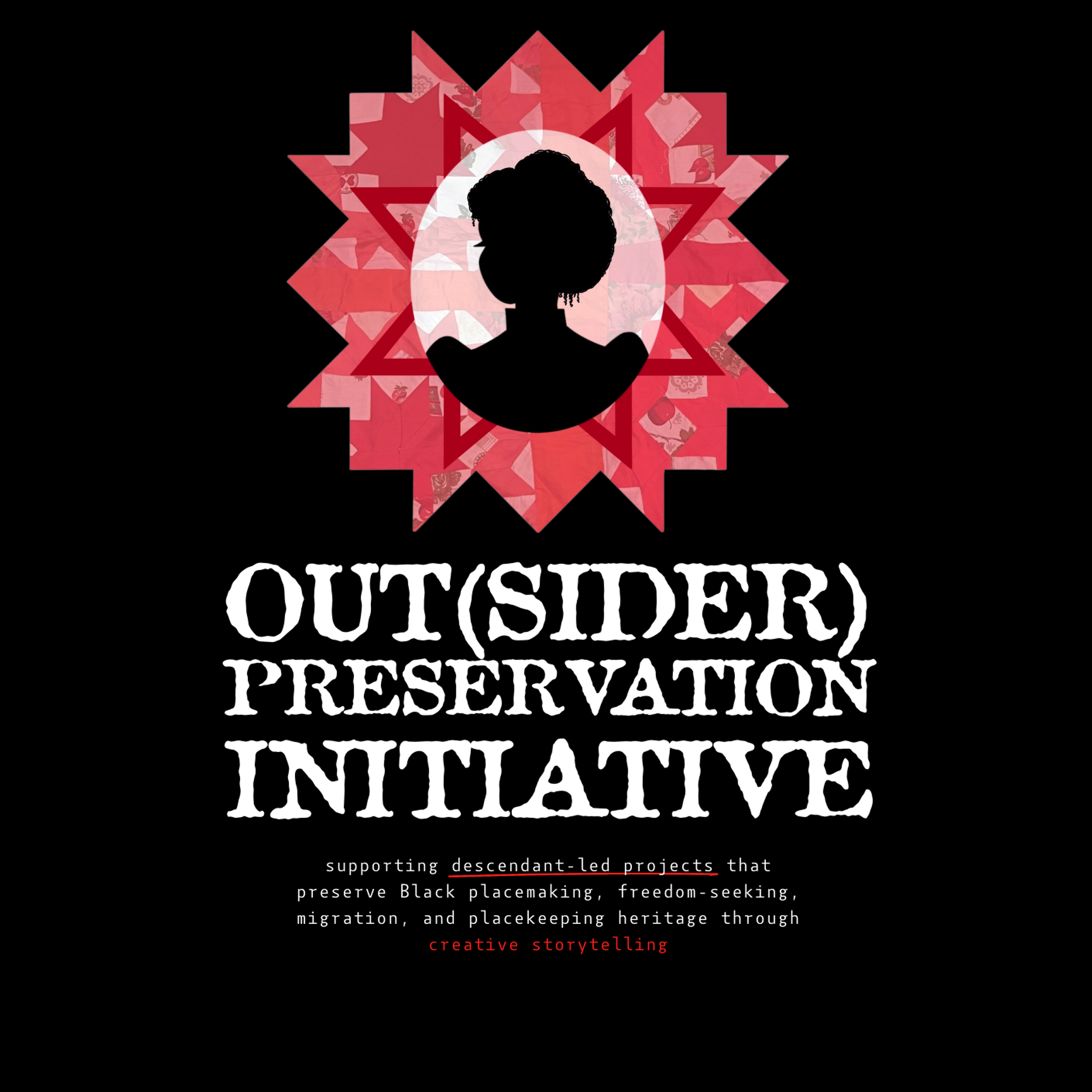
The Center for Cultural Landscapes Announces 2025 J.B. Jackson Book Prize Winner
The UVA Center for Cultural Landscapes’ J.B. Jackson Book Prize jury has selected James Michael Buckley’s City of Wood: San Francisco and the Architecture of the Redwood Lumber Industry, (University of Texas Press, 2024), as its 2025 winner.

Buckley’s prose is fine-grained in the worlds it creates through its narrative structure. It is also self-aware, building on and critiquing the methodological innovation of scholars such as William Cronon, whose Nature’s Metropolis: Chicago and the Great West (1991) underscored the interconnections between Chicago’s urban history and its regional hinterland. Unlike Cronon, Buckley inserts the spaces of manufacturing the region’s natural resources (redwoods) into the changing form of San Francisco’s hinterland, and especially its peri-urban condition.
By treating the architecture of San Francisco and its forest hinterland as a continuous regional landscape, we have blurred conventional boundaries between city and country in order to develop a clearer sense of the relationship between people and their environment. In a 2022 Society of Architectural Historians roundtable entitled “Rethinking the Urban Landscape,” Thaïsa Way and David Karmon addressed the partition of the ‘natural’ and ‘human’ landscapes that prevail in the work of architectural historians. City of Wood illustrates one possible response to this call for architectural historians to better integrate their work with histories of the natural environment.
— James Michael Buckley, City of Wood, p. 266
City of Wood is the culmination of 25 years of research, and it shows. So rich in primary sources, it does something that landscape and architectural historians struggle to do—really charting how the movement of a material like wood shapes the landscapes of the rich and poor throughout the region, and how interconnected built environments are while being disparate. Jury Chair Elizabeth Meyer (University of Virginia) and the jury members noted that it is rare to find a scholar with such methodological rigor and innovation also attending to the spatial qualities of place and the physical aspects of landscape so carefully. Buckley’s book has much to offer other historians— whether garden and landscape, cultural geography, environmental, economic, vernacular architecture, or urban planning in their roots. The analysis of the multi-scalar production of spaces from the forests, mills, lumber yards, railyards, and factories, to homes, commercial buildings, and monuments, is enriched through Buckley’s vivid evocation of the specific places within the San Francisco region.
The members of the jury, Bradley Cantrell (University of Virginia), Sarah Lopez (University of Pennsylvania), and Laura Martin (Williams College), were unanimous in this selection, praising the book as carefully researched and beautifully written. City of Wood quickly emerged as a top contender during the summer-long review of over thirty books submitted by an impressive group of scholars and presses. The authors included architects and landscape architects, art and architectural historians, urban and environmental historians cultural and historical geographers, journalists, layers, public intellectuals, as well as garden and landscape historians. The jury relished the varied viewpoints and methods that these authors and their presses bring to landscape studies.
The John Brinckerhoff (J.B.) Jackson Book Prize is awarded to the author of a book published within the past three years on a subject pertaining to landscape studies. There are no restrictions with regard to period, topic, or author’s nationality. Only books based on original research and those that break new ground in method or interpretation are considered. The purpose of this prize, awarded annually since 2011, is to reward contributors to the intellectual vitality of garden history and landscape studies. Buckley will receive a $2000 cash prize and participate in a public discussion about his book with Professor Elizabeth Meyer at the University of Virginia in spring 2026.
_____________________________________________
2025 J.B. Jackson Book Prize Finalists
This year, the award jury chose one prize winner for the J.B. Jackson Book Prize, and two finalists which exemplify novel ways of documenting, analyzing, and narrating landscape studies. These recognitions celebrate recent (2022-2024) scholarly publications of landscape historians, historical geographers, urban historians, and art historians involved in landscape studies and the environmental humanities. The two finalist titles are J.T. Roane’s Dark Agoras: Insurgent Black Social Life and Politics of Place (New York University Press, 2023) and Empty Pedestals: Countering Confederate Narrative through Public Design (Louisiana State University Press, 2024), an anthology edited by Kofi Boone and M. Elen Denning.
Dark Agoras makes a valuable contribution to landscape studies in its focus on Black modes of urban assembly as acts of insurgency and worldmaking. Roane’s use of novel archival materials, such as police records, to explore the relationship between social life and place, as well as his explorations of stoops, streets, and rooftops, offers landscape historians new insights into the complex networks of public and private spaces in the urban cultural landscape.
Boone and Deming’s Empty Pedestals, assembled in response to the summer 2020’s Black Lives Matter movement, is unusually coherent for a multi-authored anthology. Its seventeen essays are brought into focus through the editors’ introductory essays and the book’s three-part organization—Part I. Context, Experience, Perspective; Part II. Narrative, Strategy, Design; and Part III. Action, Reflection, Healing. Juror Bradley Cantrell notes that Empty Pedestals situates landscape architecture as a medium for reinterpreting public memory, encouraging scholars to explore how designed spaces can confront and reframe historical narratives. This groundbreaking book reframes Confederate monuments as evolving and dynamic cultural landscapes, advancing landscape studies through a "medicinal design” framework that addresses trauma. Its interdisciplinary approach offers strategies for reparative public spaces through case studies that rely on physical and perceptual expressions.
Jury Chair Elizabeth Meyer, noting that both Roane and Boone acknowledged the important influence of scholar K. Ian Grandison (University of Virginia Professor of English and affiliate faculty in American Studies, previously at the University of Michigan) on their early academic experiences, recognized that the field of landscape studies is benefitting immensely from the infusion of intellectual lenses and research methods of Black Studies and Black Geography.
Collectively, we sought books with landscape as a central topic and an innovative research method clearly explained. We were drawn to books that “taught us a lot” about the author’s process of discovery and were beautifully written as well as produced. Finally, we were inspired by books that examined the material and social processes through which landscapes came into being, evolved, and changed.
— 2025 J.B. Jackson Book Prize Jury
_____________________________________________
Special Commendation
In addition to the book prize, the jury has awarded Special Commendation to Thaïsa Way, Director of Dumbarton Garden and Landscape Studies, in acknowledgement of her extensive publication history and academic contributions to the field of landscape studies during her tenure at Dumbarton Oaks.
The Center for Cultural Landscapes (CCL) at the University of Virginia continues to be grateful to the generosity of Elizabeth Barlow Rogers for transferring her Foundation for Landscapes Studies’ annual J.B. Jackson Book Prize and David Coffin Publication Grant to CCL.
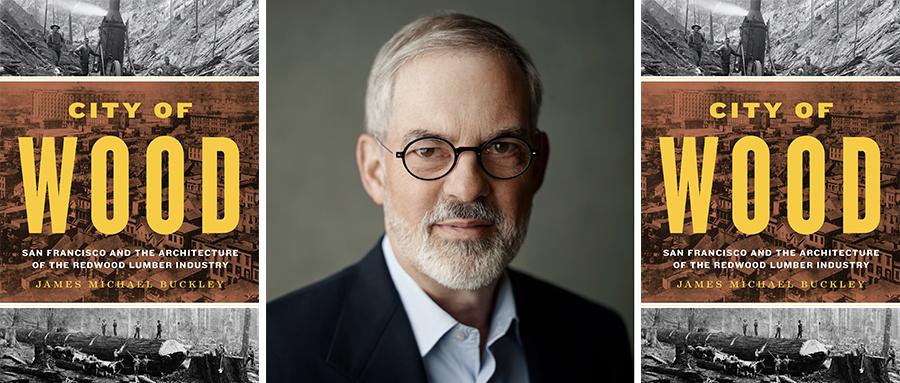
2025 J.B. Jackson Book Prize Winner
City of Wood: San Francisco and the Architecture of the Redwood Lumber Industry
James Michael Buckley
Historic Preservationist, San Francisco
University of Texas Press, 2024
City of Wood examines how capitalists and workers logged California’s vast redwood forest to create the financial capital and construction materials needed to build the regional metropolis of San Francisco. Architectural historian James Michael Buckley investigates the remote forest and its urban core as two distant poles of a regional “city” inextricably linked by the material and money that were exchanged between them. This city consisted of a far-reaching network of spaces, produced as company owners and workers arrayed men and machines to extract resources and create human commodities from the region’s rich natural environment.
City of Wood is the culmination of 25 years of research, and it shows. So rich in primary sources, it does something that landscape and architectural historians struggle to do—really charting how the movement of a material like wood shapes the landscapes of the rich and poor throughout the region, and how interconnected built environments are while being disparate.
Combining labor, urban, industrial, and social history, City of Wood employs a variety of sources—including contemporary newspaper articles, novels, and photographs—to explore the architectural landscape of lumber, from backwoods logging camps and company towns in the woods to busy lumber docks and the homes of workers and owners in San Francisco. By imagining the redwood lumber industry as a single community spread across multiple sites—a “City of Wood”—Buckley demonstrates how capitalist resource extraction links different places along the production value chain. The result is a paradigm shift in architectural history that focuses not just on the evolution of individual building design across time, but also on economic connections that link the center and periphery across space.
___________
James Michael Buckley is an urban planner and historian. He is the former Director of the Historic Preservation Program at the University of Oregon.
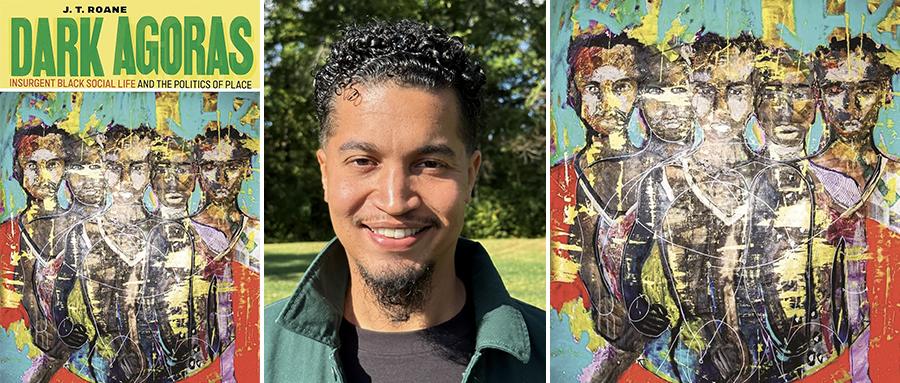
2025 J.B. Jackson Book Prize Finalist
Dark Agoras: Insurgent Black Social Life and Politics of Place
J.T. Roane
Assistant Professor, Rutgers University
New York University Press, 2023
In this book, author J.T. Roane shows how working-class Black communities cultivated inter-dependent modes of insurgent assembly—dark agoras—in 20th century Philadelphia. He invest-igates the ways they transposed rural imaginaries and practices of place into their spatial resistance and efforts to contour industrial neighborhoods. In acts that ranged from the mundane work of re-fashioning intimate spaces to expressly confrontational and liberatory efforts to transform the city’s social and ecological arrangement, these communities challenged the imposition of Progressive and post-Progressive visions for urban order seeking to enclose or displace them.
Roane’s use of novel archival materials, such as police records, to explore the relationship between social life and place, as well as his explorations of stoops, streets, and rooftops, offers landscape historians new insights into the complex networks of public and private spaces in the urban cultural landscape.
Roane brings together two formulations of collectivity and belonging associated with working-class Black life. While seemingly diametrically opposed, the city’s underground—its illicit markets, taverns, pool halls, unlicensed bars, spaces housing illicit sex and informal sites associated with economic and social disreputability—constituted a spatial and experiential continuum with the city’s set apart—its house meetings, storefronts, temples, and masjid, as well as the extensively appropriated interwar architectures of mass movements including rural land experiments, urban housing, hotels, and recreational facilities. Together these sites incubated Black queer urbanism: dissident visions for urban life challenging dominant urban reform efforts and their modes of producing race, gender, and ultimately the city itself. Roane shows how Black communities built a significant, if underappreciated, terrain of geographic struggle shaping Philadelphia between the Great Migration and Black Power. Dark Agoras will help readers appreciate the importance of Black spatial imaginaries and worldmaking in shaping matters of urban place and politics.
___________
J.T. Roane is Assistant Professor of Africana Studies and Geography at Rutgers University and Andrew W. Mellon chair in the Institute for the Study of Global Racial Justice. He is an advisory board member on the Out(sider) Preservation Initiative.
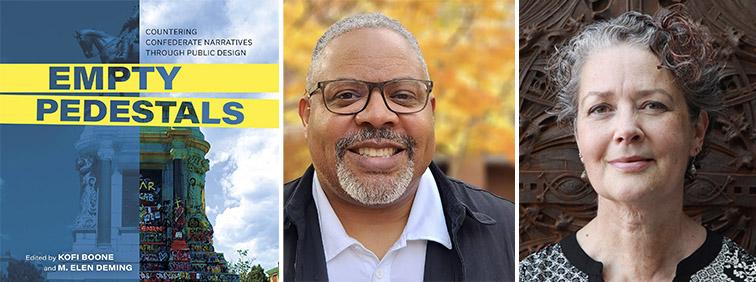
2025 J.B. Jackson Book Prize Finalist
Empty Pedestals: Countering Confederate Narratives through Public Design
Edited by Kofi Boone and M. Elen Deming
Professors, NC State University
Louisiana State University Press, 2024
This book employs design perspectives to explore how monuments to the Confederacy speak to regionalism, racist political agendas, and residual collective pain. Many designers and artists have created innovative public projects to replace Confederate memorials, contextualize those still standing, and foster new conversations about history, race, and justice in America. Drawing lessons from these initiatives and considering unanswered questions, editors Kofi Boone and M. Elen Deming hope to assist educators and students in combating endemic prejudice and social division.
This groundbreaking book reframes Confederate monuments as evolving and dynamic cultural landscapes, advancing landscape studies through a "medicinal design” framework that addresses trauma. Its interdisciplinary approach offers strategies for reparative public spaces that rely on physical and perceptual expressions.
For more than a century, the endurance of Confederate monuments, street names, and memorials in the U.S. has permitted proponents to establish false and oppressive arguments in defense of so-called historic preservation. The continued presence of these objects maintains symbolic forms of systemic injustice, exclusionary policies and practices, and erasure of stories, memories, and values of marginalized populations in the American South. While many monuments have been taken down since 2017, they account for only a small percentage of the overall number of Confederate relics on public display. Boone and Deming, along with 15 contributors, strive to elevate novel frameworks and shared solutions for the issues that continue to trouble American cultural landscapes. Above all, Empty Pedestals lifts up the voices of people who have confronted hateful narratives and devised strategies that stand up to, and apart from, old mythologies.
___________
Kofi Boone is the Joseph D. Moore Distinguished Professor and University Faculty Scholar in the Dept. of Landscape Architecture and Environmental Planning at NC State University.
M. Elen Deming is professor of landscape architecture and director of the Doctor of Design program at the College of Design at NC State University.
Contributors: Tania Allen, C.L. Bohannon, W. Fitzhugh Brundage, Elgin Cleckley, Walter Hood, Zena Howard, Blair L M Kelley, Bryan Lee, Sue Mobley, Sara Queen, Chantel Rush, Richard Schein, Dayton Schroeter, Dell Upton and David Wilson
Special Commendation
Thaïsa Way
Director of Dumbarton Garden and Landscape Studies
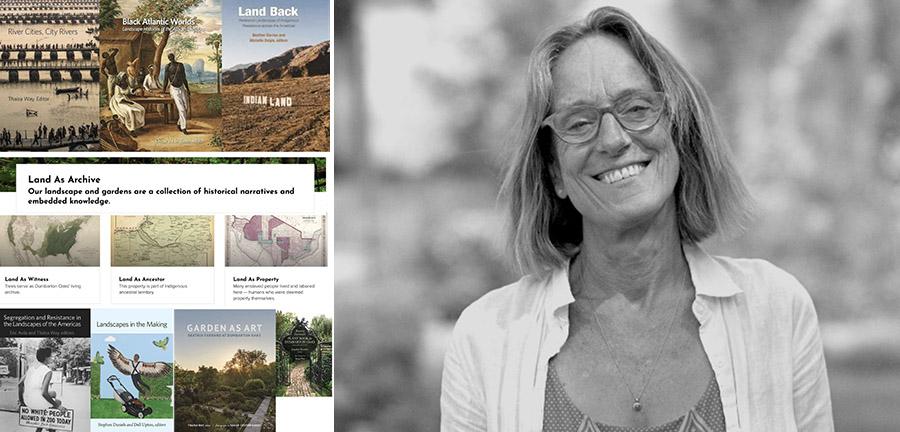
In recognition of her scholarly contributions as the Dumbarton Oaks Director of Dumbarton Garden and Landscape Studies, the J.B. Jackson Prize jury awards a Special Commendation to Thaïsa Way. During her seven-year tenure as Director, Way has welcomed and mentored a new generation of multi-disciplinary scholars and curated an astonishing collection of lectures, exhibitions, symposia, and especially related publications. Way has built on the previous work done by her predecessor, John Beardsley, who received the initial Mellon Foundation support for a Dumbarton Oaks “Urban Landscape” Initiative. In 2022, Way, in consultation with Dianne Harris (who at that time was a Mellon Foundation Program Manager) reframed the extended grant as a “Landscape and Democracy” initiative. In doing so, Way more than added onto the Dumbarton Oaks Garden and Landscape Studies legacy. She re-imagined the long-existing and renowned Garden and Landscape Studies program as a nexus for attending to the complicated entanglements of land, landscape, people, and community identity. She curated a diverse set of annual symposium topics that examined the “often neglected histories of land-based practices and the communities and places they create.”
Recent symposia publications, edited by Senior Fellows and respected scholars, speak to the impact of Way’s scholarly ambitions for Garden and Landscape Studies. The book titles include Landscapes for Sport (2022), Segregation and Resistance in the Landscapes of the Americas (2023), Land Back: Indigenous Landscapes of Resurgence and Freedom (2024), Landscapes in the Making (2025), Black Atlantic Worlds: Landscape Histories of the African Diaspora (2026), Commons and Commoning (forthcoming), and The Land has More to Tell Us (forthcoming). Next year’s symposium will address "Migration and Place". Way’s vision for Garden and Landscape Studies included more than hosting annual symposia; she created a new community of multi-generational knowledge keepers and scholars pursuing “research on spatial histories and narratives that engage with questions of how place and land/water have intersected with histories of race, gender, sovereignty, migration, and design among other forces.” In addition to the annual symposium publications, Way has supported the Dumbarton Oaks Ex Horto series dedicated to reprinting classic texts on landscape design.
While attending to the scholarly contributions made in symposia and their publications, Way has also looked inward to the histories of Dumbarton Oaks itself. She supported the re-publication of a revised edition of the classic text, Beatrix Farrand’s Plant Book for Dumbarton Oaks (1941). She edited Garden as Art: Beatrix Farrand at Dumbarton Oaks, a volume of essays placing Farrand’s designs in the context of the early 20th century in Washington DC. Beyond the publications, she dedicated resources and mentored interns in service of researching and interpreting the deep history of the land upon which the Dumbarton Oaks gardens were designed. Exhibitions such as "Land as Archive" explored three layers of history—Witness (the garden’s witness trees), Ancestor (the Piscataway homelands), and Property (the settler colonists)—that are all embedded in the Dumbarton Oaks site in Georgetown. In addition, she is an advisory board member on the Out(sider) Preservation Initiative.
Thaïsa Way’s profound impact on landscape studies as a discipline through publications, mentoring, community building, and public advocacy, is recognized by the jury who wishes her all the best in her next endeavor as the Director of the University of British Columbia School of Architecture and Landscape Architecture.
***
The 2026 Landscape Studies Initiative Book Awards
Details about the 2026 UVA CCL’s Landscape Studies Initiative Book Awards will be available in October on the Center for Cultural Landscapes website.
Submissions for books published between 2023 and 2025 are eligible for the J. B. Jackson Book Prize. Nominations are due May 1, 2026.
Authors who need pre-publication funding, such as travel and/or photography, are encouraged to apply for the David Coffin Publication Grant.
Submissions are due January 1, 2026.
Professor Meyer welcomes inquiries about the awards program at Lsibookprize@virginia.edu.

